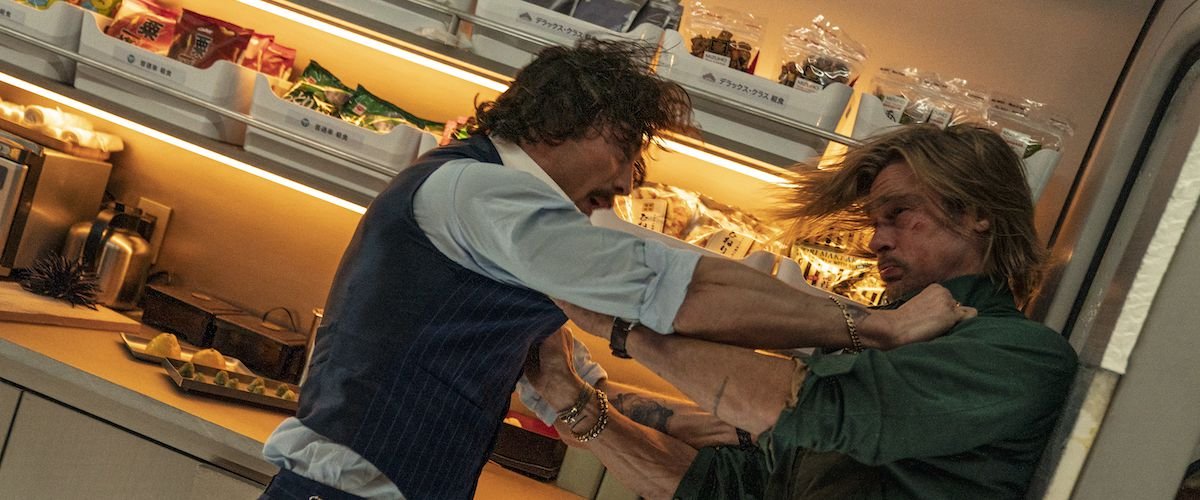"Bullet Train" - Film Review
Ladybug (Brad Pitt) is an unlucky assassin who’s on his first day back at work. He’s been taking some time off to find peace and purpose in his life. Ladybug has been assured by his handler (Sandra Bullock) that this assignment will be easy. He needs to board the midnight bullet train in Tokyo, grab a briefcase, and get off at the next stop. Simple as that. Except Ladybug’s not the only killer on this fast-track to Kyoto. Brothers Lemon (Brian Tyree Henry) and Tangerine (Aaron Taylor-Johnson), The Wolf (Bad Bunny aka Benito A. Martínez Ocasio), The Hornet (Zazie Beetz), The Prince (Joey King), and Father (Andrew Koji) all have their own reasons for wanting the briefcase.
Much of Bullet Train’s success lies entirely in the hands of the audience’s perception of Pitt. Those who find his boyish good looks attractive or think they’d like to grab a beer with him will readily overlook his stilted nature. Those who are not under the magic of Pitt will find him woefully miscast.
columbia
This critique is beginning to feel like a broken record, but so many recent movies are trying to capture what Ryan Gosling, Russell Crowe, and Angourie Rice made look so effortless in The Nice Guys. It takes talent to play the fool, and it’s a talent Pitt does not have. He works so hard to maintain his sense of cool throughout that it ultimately keeps him from fully leaning into being the clown the film is asking him to be. And someone has to play the fool for Bullet Train to be the fun-filled ride it claims to be.
The blame, of course, doesn’t lie fully with Pitt. The script doesn’t do any of the characters any favors. Most of the actors are miscast, with only Henry and Taylor-Johnson providing some much-needed charm. While Lemon’s repetitive references to Thomas the Tank Engine become grating, the dynamic of the mismatched brothers is at least endearing enough to cut the characters a little slack. Other actors, including Karen Fukuhara, Beetz, and Bad Bunny aren’t given enough time to show their worth.
The script is also lacking in the plot itself. Anyone who applies the smallest amount of critical thinking can figure out the twists and turns within the first thirty minutes. Those same thirty minutes are bogged down with so much exposition that it feels like the train is moving at a snail’s pace.
It’s impossible not to spend some time talking about Bullet Train’s use of Japanese culture. While adapted from a Japanese novel by Kōtarō Isaka, the film’s main characters have been changed to non-Asian characters. Bullet Train’s remaining Japanese characters are relegated to supporting roles, while Japanese culture is used to create an aesthetic. It’s as if the culture is simply an “exotic” set dressing for American audiences.
Bullet Train isn’t going anywhere fast. It’s self-indulgent and thinks it’s doing something entirely unique. The film gives itself far more credit than it deserves. The visual style, the “quippy” one-liners made directly to the camera, and the flashy text overlays have all been seen before. Just because you dress it up in a bucket hat and put it on a bullet train doesn’t make it new. That’s not to say that a film has to be new or unexpected to be enjoyable. There are plenty of films whose endings are obvious based on their beginnings. Stories have been retold over and over again since the beginning of humanity, but the journey has to be worth it. Bullet Train’s destination does not justify the journey.
Follow me on BlueSky, Instagram, Letterboxd, & YouTube. Check out Movies with My Dad, a new podcast recorded on the car ride home from the movies.

